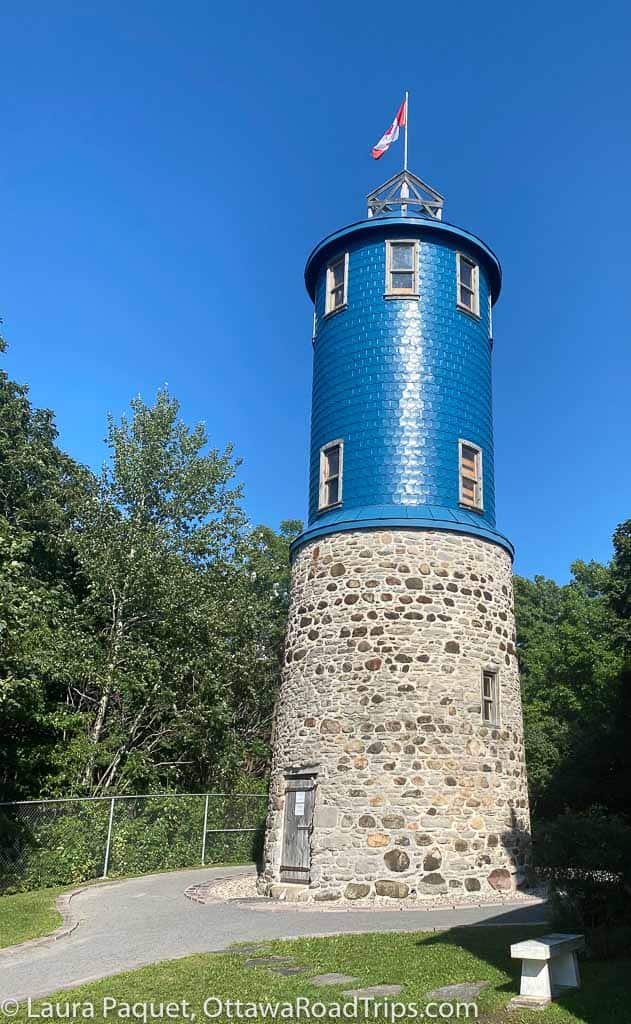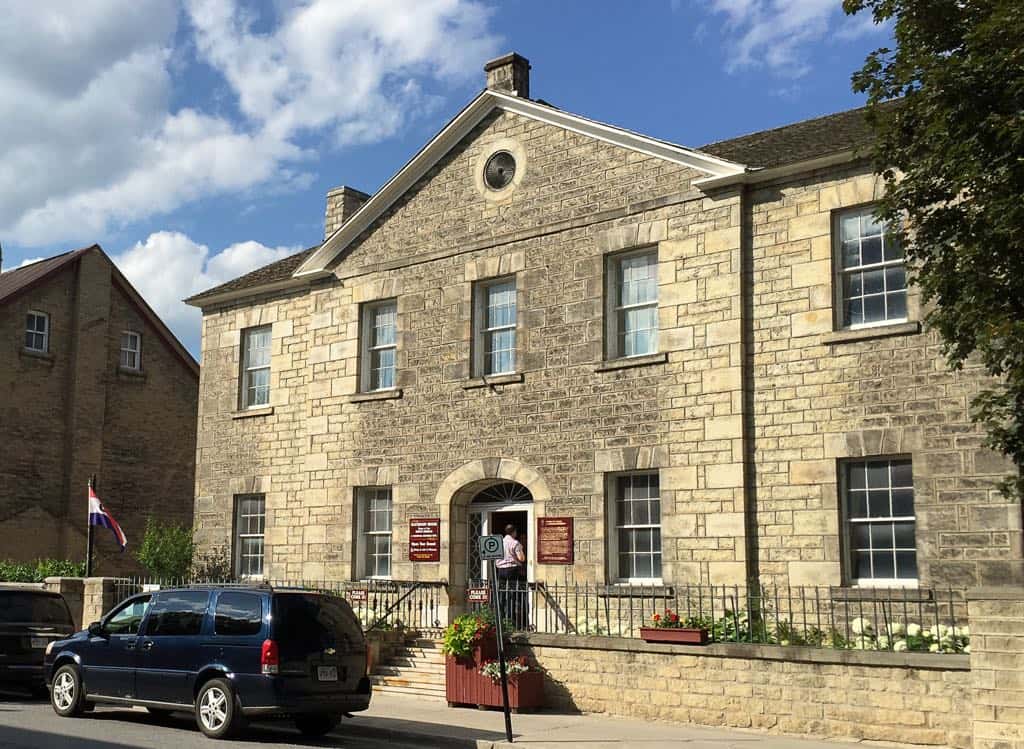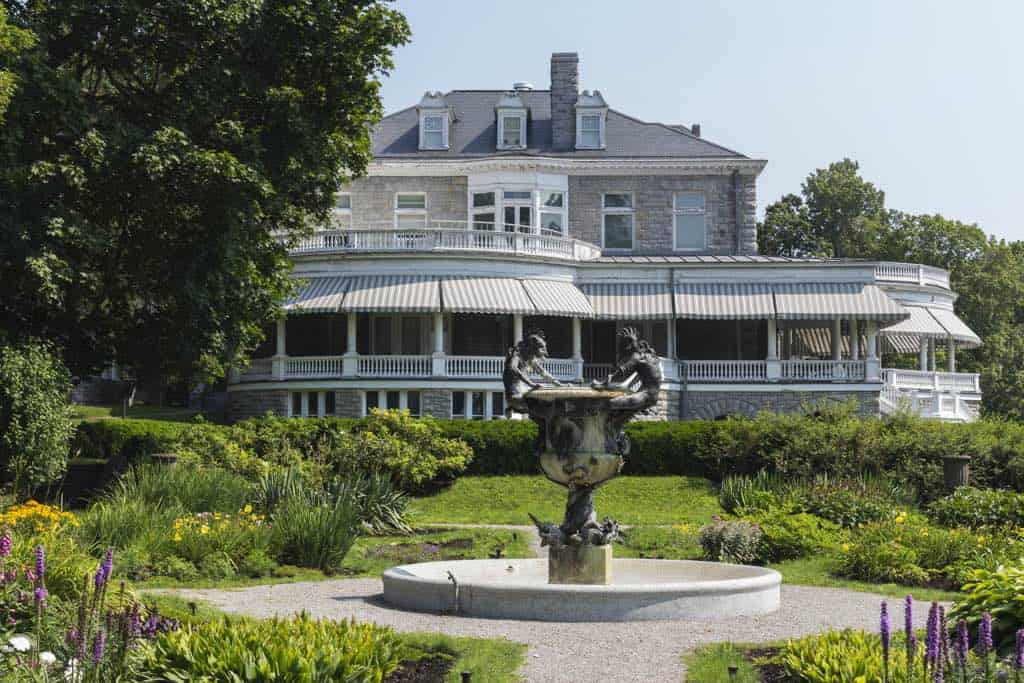Long-time readers will know that I’m a sucker for historical tales. Here are the intriguing stories behind four Eastern Ontario sites: Fulford Place, Higginson Tower, St. Andrews West and Perth—the town that witnessed Ontario’s last duel.
St. Andrews West
Another tall landmark, the 208-foot steeple of St. Andrews Catholic Church, dominates its namesake village just north of Cornwall. (Check out this Ottawa Citizen story to see photos of a new cross being installed at the top by crane in December 2020.) However, the most fascinating thing about the village of St. Andrews West isn’t the steeple but a nearby graveyard. It is the eternal resting place of both a famous explorer (Simon Fraser, who gave his name to a river and a university in British Columbia) and Ontario’s first premier (John Sandford MacDonald, not to be confused with his contemporary, Sir John A. Macdonald).
Higginson Tower

One of the most eye-catching landmarks in the village of Vankleek Hill is unusual-looking Higginson Tower, with its stone base and bright-blue top. It traces its roots back to one Lieutenant-Colonel Thomas Higginson, an Irish immigrant who built it as a wind-powered gristmill sometime around 1830. Despite the fact that it’s built on one of the highest points of land in the area, there wasn’t enough wind to keep the blades turning frequently. So Higginson removed them and turned the tower into a private astronomical observatory.
After briefly using the structure as a watchtower to spot Fenian raiders in the 1860s, Higginson’s son William added the upper section. He then opened the tower to students of the village high school so they, too, could observe the stars. The tower eventually fell into disrepair, but a community group restored it in the early 2000s.
Perth: Site of Ontario’s last duel

Thanks to Hamilton, interest has surged in the peculiar dispute-resolution process known as duelling. And if you head to Perth, about an hour southwest of Ottawa, you can learn all about Ontario’s last fatal duel, which took place in the picturesque town on June 13, 1833.
Two 20-something law students, Robert Lyon and John Wilson, faced off in a romantic dispute over the affections of a teacher named Elizabeth Hughes. When the smoke cleared, Lyon lay dying. Two years later, Wilson married Hughes; he later became a member of Parliament.
In 1973, Stompin’ Tom released his version of a song about the two men, “The Last Fatal Duel.” The following year, the pistols used in the duel were nicked from the Perth Museum and buried elsewhere in town. They’ve since been dug up and returned to the museum, where they remain on display. (The museum itself is housed in a mansion built in 1840 for a rich merchant and senator.)
Fulford Place

Sure, there are lots of grand old mansions overlooking the St. Lawrence River in Brockville. The thing that makes Fulford Place stand out from the pack is the source of the money used to construct it.
Senator George Taylor Fulford made his millions by selling “Pink Pills for Pale People”—a compound of ingredients such as magnesia, powdered liquorice and iron sulphate that promoters claimed cured everything from heart palpitations to neurological diseases. Coated in pink sugar, they were sold around the world and earned Fulford enough to build this 20,000-square-foot home between 1899 and 1901. The Ontario Heritage Trust owns it now and runs it as a museum.
Looking for more fun stories about Eastern Ontario, the Outaouais and points beyond? Subscribe to my free weekly newsletter!

1 comment
[…] The grand old Brockville mansion was built by a man who made his fortune selling patent medicines. You can learn more in my post, “Do you know the cool stories behind these Eastern Ontario landmarks?” […]